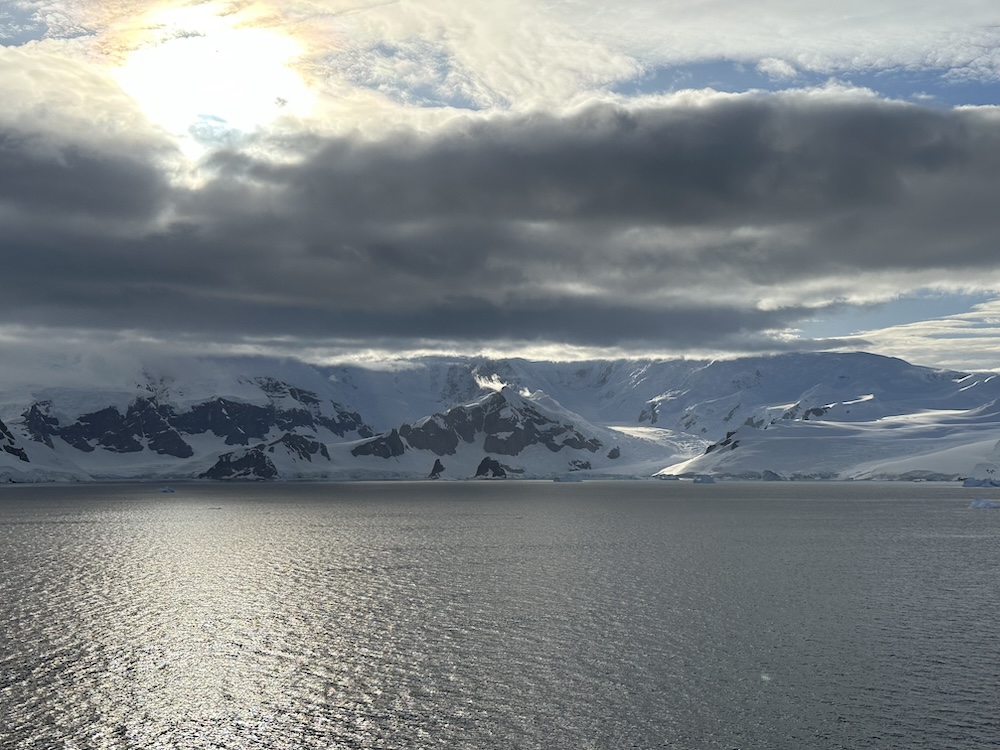
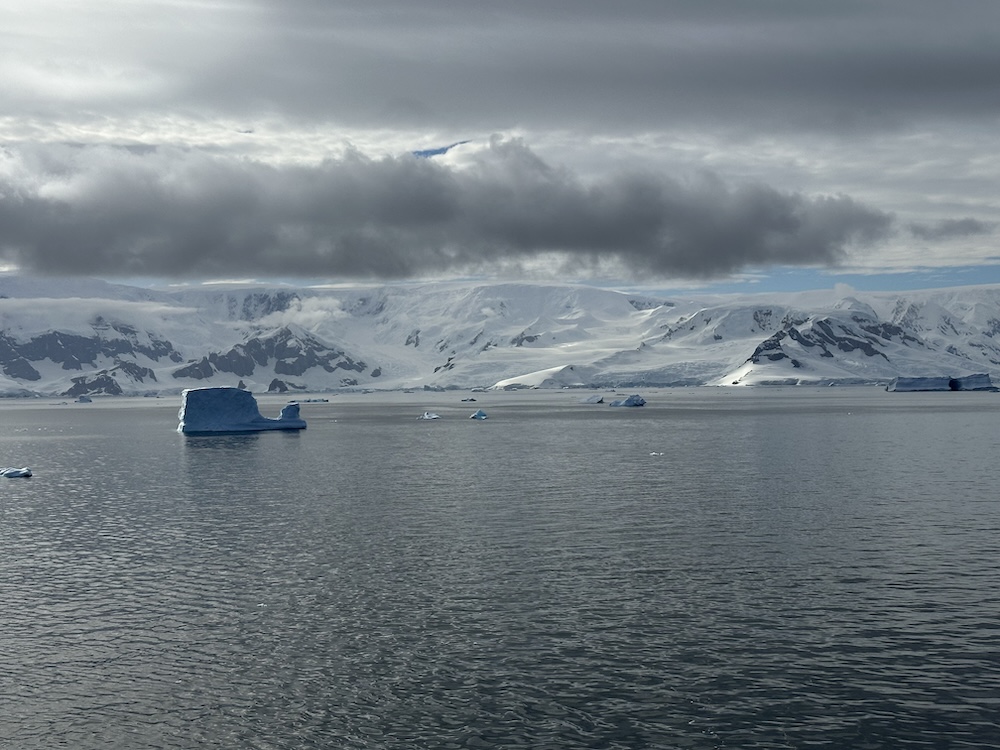
When you think of the Antarctic, what images does your mind conjure up? Probably endless snow and ice packs with icebergs floating by. No doubt penguins and whales as well. Subzero temperatures. How about Eskimos, igloos and polar bears? Sorry no. Wrong hemisphere. That’s the Arctic, not the Antarctic where the South Pole is located. Sounds like a God-forsaken place. Actually it is not. By some accounts, it boasts some of the most majestic and specular scenery on earth, and only .000027 percent of earth’s population or 100,000 people visit this bottom of the world continent each year, and my wife and I were recently one of those blessed people. Without a doubt, Antarctica is an exceptional, other-worldly place unlike any other on earth. It was there that I met our exceptional YHVH Elohim, the Creator of it all, in new and enlightening way. What follows chronicles this divine encounter and how he is calling his people to join him at a new level of exceptionalism.
Let’s go back to the beginning for a quick history review. Never forget that to know where you are going or your destiny, you must know where you are at, and to know that you need to know where you came from. That said, YHVH Elohim created man in his own image with the destiny and potential to become like him. He placed man in the idyllic setting of a garden and invited man to walk with him in this most blessed and exceptional place. Sadly, man chose to walk the downward rather than the upward path, and from that time until, the Creator has had his hand extended inviting those whom he created in his image to pursue an upward path leading to another garden and place of encounter with him, namely, the New Jerusalem. The point of the Bible, therefore, is to shine a spotlight on this upward path that if taken will bring man to his exceptional destiny. Everything else contained therein is the how, step-by-step process of coming to this place. Along the way, a few notable biblical characters have caught visionary glimpse of this higher walk, the ultimate goal, and they have recorded it for us to inspire to join them on the same journey—to embrace the upward calling by accepting the divine invitation to exceptionalism.
Without a prophetic vision of our destiny, we are likely to grow weary in the journey and possibly even perish spiritually along the way (Prov 29:18). The following Bible verses cast the vision and point us in the right direction.
Now I am no longer in the world, but these are in the world…I have given them thy word; and the world hath hated them, because they are not of the world, even as I am not of the world. (John 17:11, 14)
And hath raised us up together, and made us sit together in heavenly places in Messiah Yeshua, that in the ages to come he might show the exceeding riches of his grace in his kindness toward us in Messiah Yeshua. (Eph 2:6–7)
Elohim eye has not seen, nor ear heard, neither have entered into the heart of man, the things which Elohim hath prepared for them that love him. But Elohim hath revealed them unto us by his Spirit: for the Spirit searcheth all things, yea, the deep things of Elohim. For what man knoweth the things of a man, save the spirit of man which is in him? even so the things of Elohim knoweth no man, but the Spirit of Elohim. Now we have received, not the spirit of the world, but the spirit which is of God; that we might know the things that are freely given to us of Elohim. Which things also we speak, not in the words which man’s wisdom teacheth, but which the Holy Spirit teacheth; comparing spiritual things with spiritual. But the natural man receiveth not the things of the Spirit of Elohim: for they are foolishness unto him: neither can he know them, because they are spiritually discerned. (1 Cor 2:9–14)
For our citizenship [community] is in heaven; from whence also we look for the Saviour, the Lord Yeshua the Messiah: Who shall change our vile body, that it may be fashioned like unto his glorious body, according to the working whereby he is able even to subdue all things unto himself. (Phil 3:20–21)
Make no mistake, not because of any effort on our part or any redeeming qualities that we may possess, has Yehovah Elohim called. It is only according to his sovereign will, mercy and grace that he has called each of us to come up higher to himself. Let us never forget that we have not chosen him, rather, he has chosen us and that we, in our state of spiritual lostness and sinfulness, simply responded to his calling to come out of this world and come up (emphasis on the word up) to him morally and spiritually and eventually literally or bodily at the resurrection. Presently he is calling us to transcend the physical and carnal existence of this earthly cosmos, and to come up or closer to him. He has shown us the way up, which is the way of the cross. This is the only door or gateway to our Father in heaven and the only way to be admitted or adopted into the eternal family of Elohim. The Bible is the revelation of this divine path upwards.
Yet this narrow path is much nobler and higher than most religious systems of men have sadly made it out to be. The upward path is vastly more than mere dogmas, rituals and legalistic systems of dos lane don’ts. Although many Christians, to their credit, have caught glimpses of this path, most churches, denominations and Christian instructional institutions have largely missed the bigger picture of what the Bible teaches regarding the higher path. Most prefer instead to take a mere snapshot of the Infinite and then quantify that one glimpse into a system that can then be packaged, labeled, promoted and marketed for the gain or profitability of the few at the top of the organizational pyramid. Even most well meaning but misguided promoters off a more Hebraic approach to the Bible are guilty of this, for they have learned well from their mainstream Christian mentors how this system works and are by default replicating it either out of ignorance, self-serving interests, or even nefarious and ulterior motives.
John the Baptist faced the same problem with the religious system of his day, which is why he left the organized religious system of the Levitical priesthood and shunned the pseudo-righteousness promoted by the Pharisees. Disgusted, he exited this sociological and physical system choosing rather to operate in the wilderness of the Jordan Valley well outside the environs of Jerusalem and its temple. His divine mission was to prepare the people for Yeshua’s coming by calling them to the higher ways of Torah through repentance and a spiritual conversion. This mission could only be fulfilled outside the limiting confines of men’s traditional religious paradigms. The old wine skins were unable to contain the new wine. The same can be said of the biblical prophets who typically were loners and outcasts. In our day, some of us view ourselves in ways analogous to John and may even have a similar calling and path to walk in as we help to prepare the way for the Messiah’s return.
A deep and long study of the Scriptures reveals that ultimately the Bible does not promote rules, regulations and dogmas as much as it points people to Yehovah and toward the upward spiritual path of excellence and exceptionalism leading to an eternal relationship with our Creator. The writings of Paul and the first epistle of John capture the sweet nectar, the captivating fragrant aroma and the quintessential essence of this higher path in the New Testament as does Deuteronomy in the Torah and several of the Old Testament prophets such as Isaiah.
This upward path in symbolic form is Jacob’s ladder to heaven which involves walking out Torah through a personal relationship with Yeshua the Messiah, who is man’s ladder to heaven (John 1:51). Or as Paul states, he characterized his approach to Torah as being “under the law to [literally, through] Messiah” (1 Cor 9:21).
No less a figure than Yeshua himself expresses this same higher approach to Torah in his heavenly sublime and elegant final instructions to his disciples prior to his arrest in John’s Gospel chapters 14 through 17. He is about to reunite with his Father in heaven by way of the cross, and he in turn invites us, his disciples, to follow him upward to his Father, for he is the way to the Father. That way involves a full dose of both letter and spirit obedience to his Torah as he eloquently teaches in his Sermon on the Mount (Matthew chapters five through seven). Paul characterized his upward spiritual journey similarly although he admits that he had yet to attain that lofty goal to which he had committed himself unequivocally and unreservedly (Phil 3:12–13).
I press toward the mark for the prize of the high calling of Elohim in Messiah Yeshua. Let us therefore, as many as be perfect, be thus minded: and if in any thing ye be otherwise minded, Elohim shall reveal even this unto you. (Phil 3:14-15)
As I have reading and rereading the Bible daily for approaching six centuries, I see more clearly at a higher level than ever before a more stunning picture emerging of a higher high way to our Father in heaven than is often taught and believed. This is the Bible’s divine invitation to a higher, other-world level of excellence and exceptionalism to which our Creator is calling us as his potential children and adopted members into the forever family of God as children, mini-elohims or members of the God family (John 1:12; Rom 8:14–15, 23; 9:4; 2 Cor 6:18; Gal 4:5-6; Eph 1:5; 1 John 3:1–2; Rev 21:7; Ps17:15).

I am writing this as I exit the waters of the Antarctic in a ship. For the past several days, we have been experiencing up close the expanse of the endless white wilderness of the Antarctic Peninsula in all of its pristine glory and majesty. Words cannot express the spectacular grandeur of this land that few of eyes have ever seen. As has been said by others, Antarctica is akin to Alaska’s famed Inside Passage, but on steroids. Or as I would express the comparison between the two, Alaska’s Inside Passage, as glorious as it is (I have made this voyage so far three times), is a mere footnote to the volume entitled “Antarctica”.
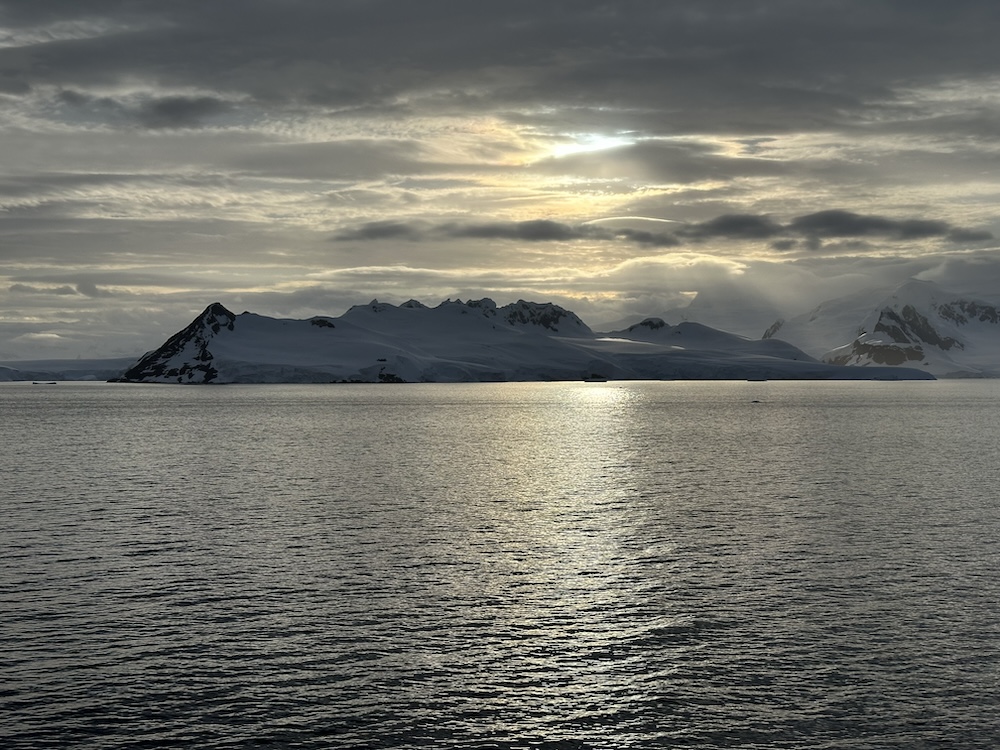
Why is my trip to Antarctica apropos to this discussion on exceptionalism leading to the higher spiritual path to which our Father in heaven has called us? It is because viewing this continent (which is twice the size of Australia and at places has ice that is several miles thick) transports one to another dimension, for there is no place like this elsewhere on earth (and I have visited more than 30 countries on six of the seven continents). Visiting this place has the potential to transport a deeper thinking person to places in one’s thoughts where they have possibly never ventured before. Such has been the case with me. Without a doubt, we are moved and inspired by our surroundings—by the things we see, feel and hear. Exceptional and novel life experiences have the ability to transport us to mental, emotional and spiritual places we have never been before if we will only open ourselves up to this. Perhaps we will even hear heaven’s voice and receive some measure of enlightenment. Such has been the case with me. For me, the Antarctic has been the birth place of some divine revelation from heaven flowing to me as I sail the silent waters off this vast continent, and my thoughts are carried to another, higher place. In this quiet land of endless white landscape stretching from seashore up the winding and tortuous glacial staircase to the mountaintops from which these vast glaciers originate, I am hearing heaven’s still small voice—a whisper that shouts loudly into my spirit unhindered by the confusing babble and cacophony of the man-made cosmos that usually envelopes virtually suffocating a person in the city—a place the Bible euphemistically refers to as “Babylon the Great.”
Throughout the Bible we encounter the life experiences and read the words of humans who have seen a more expansive and loftier picture of man’s ultimate spiritual destiny. For example, Abraham perhaps caught a glimpse of this when we saw the Jerusalem from above who is the mother of us all (Gal 4:26), and even the cross of Yeshua at the binding of Isaac. In the midsts of his sufferings, Job envisioned the need for a redeemer (Job 19:25). Moses had a similar vision when he possibly received a vision of the higher and ultimate Promised Land from Mount Nebo just prior to his death. Other visionaries included David who not only recorded many messianic prophecies but had a sense of man’s ultimate destiny concerning the resurrection and inclusion in the family of Elohim. The prophet, Isaiah had similar visions as well as did Paul the apostle along with his apostolic contemporaries. And how can we overlook Hebrews chapter eleven, the Faith Chapter, with its list of Old Testament visionaries who lived lives of exceptionalism as they looked beyond this physical dimension preferring the delayed gratification required to receive a higher heavenly reward?
So what is this exceptionalism to which I keep making reference? I propose that the exceptionalism is like a diamonds with multiple facets. Several notable aspects may include high levels or standards of righteousness, and a higher level of spiritual consciousness as exemplified by several notable figures in Scripture (e.g., Moses, the prophets, Yeshua and his apostles). This higher spiritual path that many biblical exemplars trod often involved mountain moving faith and resulting in miracles (e.g., Moses, Elijah, Elisha, the apostles in the Book of Acts). Does this sound like a concept out of the New Age movement or Eastern mysticism? Perhaps, but this is not what we mean. Remember this: anything that new age philosophy or even Hinduism or Buddhism has invented is merely a satanic counterfeit or perversion of a biblical truth. Is this idea threatening to you? It shouldn’t be, for if we thoroughly know the Word of Elohim and have even an inkling of the depths thereof, then we will be able to discern the difference between the true and false, and from there separate the wheat of truth from the chaff of error with the help of the Holy Spirit.
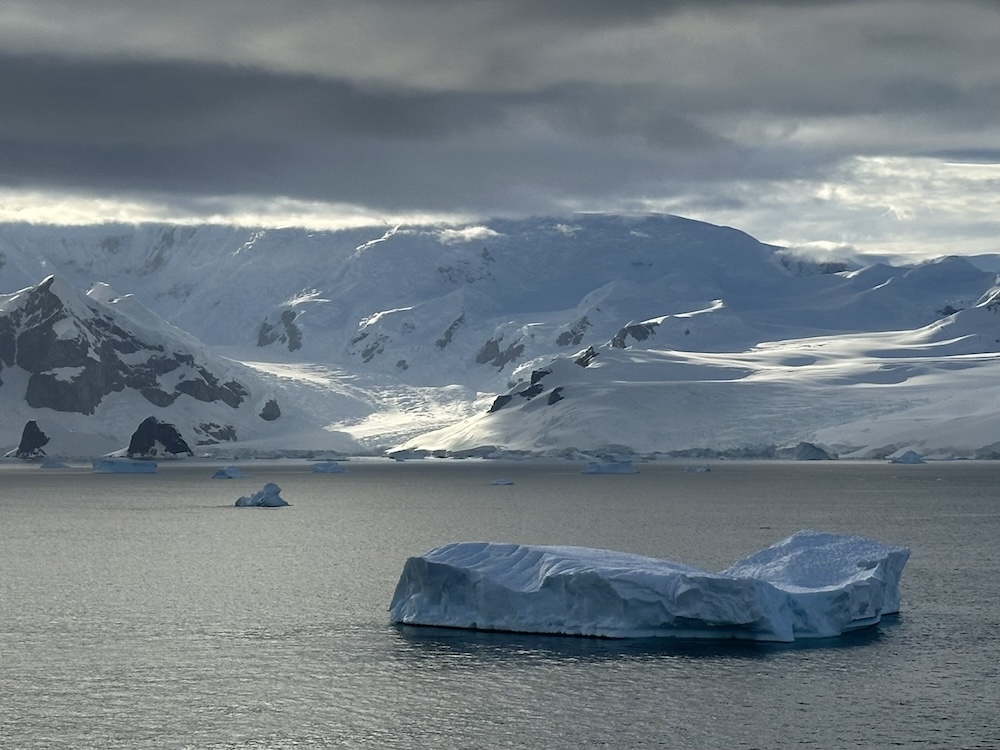
For us to reach this higher level of conscious awareness, we must face a fact. It is this. The religious systems we have come out of have to one degree or another have boxed in and limited Elohim, and now is the time to open up those boxes and to let him be the vast and unfathomable Creator that he really is sans man’s limited view of things based on low-level religious perspectives. Viewing places like the endless mountains and ice sheets of Antarctica and seeing its limitless pure white expanses has triggered, no rather launched, my thoughts to think of the infinite vastness of the possibilities of who Elohim really is outside of the narrow confines of our parochial views and limited perspectives defined and confined by men’s religious dogmas and rituals. These have been invented to imprison men and Elohim God in neatly labeled religious boxes that can then be conveniently packaged and marketed by the greedy gospel peddlers and other religious hobbyists. Away with this system and approach and, and away with these people! Judgment begins first at the house of Elohim. The spiritual commode is about to be flushed. Presently, Elohim is calling his people upward and onward and closer to him. Never forget this. Yeshua the Messiah never came to create a church, a religion or a religious movement! He came to create a new race of humans—a glorified, heavenly family! Christianity as a whole along with its Messianic or Hebrew roots subsidiaries have largely missed the mark of promoting this higher biblical view of man’s ultimate destiny. It is time for YHVH’s people to exit the confines of the chicken pen of religiosity and to mount up with wings like an eagle flying closer to the Sun of Righteousness, who is the divine Light of the world, and whose face shines like the sun in its full glory!
Let us now briefly explore the higher realm of divine exceptionalism and a higher level of spiritual awareness or consciousness by giving several examples from the lives of notable saints who have gone before us to reveal this more noble, upward path. Hopefully this will inspire each us to follow in their footsteps.
In the area of exceptionalism pertaining to righteousness and an elevated spiritual consciousness, the Bible ultimately promotes a righteousness and consciousness that transcends mere obedience to the rules and regulations relating to a letter-of-the-law righteousness. As wonderful and necessary as rules and regulations are as defined by YHVH’s precious Torah commands, and as I have elaborated voluminously elsewhere for years as much or more than most Bible teachers, they are merely the rails to keep the train of our lives on the straight and narrow track that leads to inclusion in the family of Elohim. As glorious and necessary as the YHVH’s Torah is to our physical and spiritual well-being, Torah is simply a means two to an end. It is a like a vehicle that will transport us to the destination, but it is not the destination itself. At an even higher level, Yeshua, the Living Torah, is our mode of transport, if you will, to our Father in heaven. That is why he referred to himself as “the way, the truth and the life”, or as heaven’s door, or as a shepherd who guides his sheep-followers to the greener pastures of something better than this physical existence has to offer. This higher level is the ultimate exceptionalism to which we are being called if we will accept heaven’s invitation to come up higher. This is the spiritual as well as a mental and emotional paradigm from which we need to operate, to view ourselves, and through which we view every aspect of life and conduct all of our activities here below. This is the idea of seeking first the kingdom of Elohim and his righteous with all of our hearts above all else, as Yeshua taught us.
It goes without saying that Yeshua our Messiah is the ultimate example of one who operated from a higher level of spiritual consciousness. As the Son of Elohim and Elohim in the flesh, he existed on a totally different spiritual level. Many new age religionists have recognized this and have tried to co-opt our Lord and Savior as a guiding spiritual light (along with the Buddha, Mohammed, Zoroaster and other pretenders). These modern false prophets like to refer to “the Christ-consciousness.” But these so-called new agers are nothing more than counterfeiting fakers and charlatans. In a perverted sense, they are merely skimming the foam off the latté while jettisoning the substance of the coffee, which, in this case, is the gospel message along with the Torah. Unlike these satanic counterfeiters that are promoting the highway to hell, we desire the whole Truth of YHVH: the written Torah, the Living Torah, the gospel message, the totality of who Yeshua is and all of YHVH’s instructions in righteousness from Genesis to Revelation. Actually all of these are different concepts for the same thing, namely, Yehovah Elohim’s divinely revealed and immutable Truth. Yeshua was the quintessential embodiment and incarnate representation of that Truth. While he walked out the letter of the Torah-law perfectly, at the same time, he pointed his disciples to the higher level or weightier matters of the Torah (Matt 23:23), or the greater righteousness than that demonstrated by even the most legalistically punctilious Torah-obedient Jews of his day (Matt 5:20).
In pointing his disciples to the weightier matters of the higher Torah, Yeshua gives us some terse and pithy yet profoundly deep and expansive hooks on which to hang our spiritual hats. This is the true Christ-consciousness, not the pseudo-version proffered by the false prophets of the satanic religions—a message devoid of the cross and the gospel truth. For example, Yeshua taught his followers that:
You must die to live.
- It is more blessed to give than to receive.
- Whoever will be the greatest in the kingdom our heaven must become a servant to all.
- Love me more than even your closest relatives.
- Forsake all to follow me.
- Love your enemies and do good to those who commit evil against you.
- Give away your material possessions in order to become rich.
- Lay your life down in order that you may be lifted up.
- He lived and promoted the idea of laying one’s life down for one’s brother (John 15:13).
- Yeshua desired that the cup of the cross pass from him, but acquiesced to the will of his Father.
- In his final moments while hanging on the cross dying, gasping for breath, he prayed that his Father would forgive those who had crucified him.
- Many more examples could be given.
Concepts like these direct our attention to the highest high way to heaven or to the weightier matters of YHVH’s Torah-law. To live by these principles is to take Torah to its highest level and to live outside of the many of the religious paradigms and labeled boxes of cultural Christianity, mainstream religiosity and even Hebraic roots and Messianic type Christianity. YHVH is now calling all his people regardless of brands, labels, church affiliations, denominations or whatever to transcend these low-level, minimalist attempts of religion and to come up higher.
As much or perhaps more than anyone else as recorded in the biblical narrative, Paul, the apostle and imitator of Yeshua, caught the biblical vision of exceptional righteousness and an elevated spiritual consciousness when, in his instructions to the saints, he echoed the words of Yeshua in so many respects. Like his heavenly mentor, he instructed his spiritual students also to walk that upward path by imitating him as he imitated Yeshua (1 Cor 11:1). This is to transcend the low-level strictures of normative or average Christianity. This admonition equally applies to those who adhere to a more “Torah-centric” or even rabbinic Jewish approach to Christianity. We will follow in these footsteps that lead to a higher level?
Examples from Paul’s writings of exceptionalism and the higher walk include:
- For him, to live is Messiah, to die is gain (Phil 1:21–26).
- He desired to know nothing about the saints except Messiah and him crucified (1 Cor 2:2).
- He would forfeit his own salvation to see his fellow Jews saved (Rom 9:3; 10:1).
- His messenger of Satan thorn in the flesh while tormenting him made him stronger and brought him closer to the character of Yeshua (2 Cor 12:7–10).
- He cared not how Messiah was preached even if done so selfishly by pseudo-Christians was to his personal detriment, just as long as Messiah was preached (Phil 1:15–18).
- He rejoiced in the chains of his imprisonment which he saw as advancing the gospels and emboldening the saints thus bringing them glory (Phil 1:12).
- He expressed joy at suffering for righteousness sake (Phil 1:27–30).
- Esteeming others better than yourself (Phil 2:3).
- He practiced and taught the necessity of submitting one to another (Eph 5:21).
- In everything that you do, do all as unto Messiah.
- Take every thought captive to the mind of Yeshua.
- Do all things without complaining or murmuring (Phil 2:14).
- Being a living sacrifice (Rom 12:1) and being poured out as a drink offering (Phil 2:17).
- What physical achievements he had attained in his life, he was willing to give it up to follow Messiah. He counted them as rubbish that in order to gain Messiah and attain to the resurrection of the dead (Phil 3:7–11).
- He had learned to be content in all situations in his life whether he was abounding or being abased, for he confessed that he could do all things through Messiah who strengthened him (Phil 4:12–13).
Consider the idea that the epitome of Paul’s vision of this higher, less-travelled road may be First Corinthians, the Love Chapter of the Bible, where we read that love, among other things is…
- Devoid of pride and self-exaltation.
- Selfless.
- Does not permit one to be irritated.
- Thinks no evil.
- Bears all things.
- Always hopeful.
- Never fails.
This is an exceedingly high standard of excellence and exceptionalism! When the upward moving saints of the Most High Elohim fullfil these aspects of love in their daily lives, then they are fulfilling both the letter and the spirit of YHVH’s Torah-commandments at their highest level. Again, Yeshua lays out this path clearly in his Sermon on the Mount (Matthew chapters five to seven).
Moses too had a sense of this higher level when, after the children of Israel’s apostasy at the golden calf incident, he was willing to forfeit his own life to save those of the rebellious and sinful Israelites’. Or when he moved his tent away from the camp of the wicked and the complaining Israelites to the vicinity of tabernacle (a symbolic picture of heaven on earth) and thus closer to Elohim. Abraham too had a higher vision when he left the wealth of cosmopolitan Babylonia for the nothingness sandbox of Canaan. Or when he was willing to sacrifice his son trusting YHVH to fulfill his promise of a son in spite of the potential loss of his son. King David caught a glimpse of the heavenly level when he radically ripped off his constrictive royal garb representing his kingly dignity and regal authority in order dance freely almost naked in jubilation in the presence of Elohim as the ark was being brought into Jerusalem. Ezekiel stepped out of the box of staid and normative religious expression when laid on his side for months at time in obedience to YHVH as a physical demonstration of the fulfillment of an upcoming prophecy pertaining to the Jews. Similarly Isaiah preached virtually naked in the public streets, while Hosea married an adulterous whore to exemplify YHVH’s love for Israel. All of these individuals (many more biblical examples could be given as well) demonstrated an out-of-the-religious-box level of obedience to YHVH and an elevated level of spiritual consciousness. They chose a path of the radical, of being misunderstood if not rejected by those around them. Their obedience to heaven’s dictates moved them closer to heaven’s heart and, in a sense, seated them in heavenly places, even though their feet were still planted firmly on earth.
Peter too demonstrated a grasp of heaven’s highest calling for those who want to be part of the eternal and glorified family of Elohim. In his writings, we read such radical and spiritually transformative statement as,
- Rejoice in your trials because a heavenly reward awaits you (1 Pet 1:3–6; 5:10).
- Rejoice when suffering for Messiah (1 Pet 4:13).
- Love covers a multitude of sins (1 Pet 4:8).
- The way of humility and self-negation is the path to exaltation and glory in the kingdom of heaven (1 Pet 5:5–6).
James the apostle in his epistle similarly points his readers to the higher level as well. Some examples include:
- Count it all joy when you fall into trials (Jas 1:2).
- Confess your sins one to another (Jas 5:16).
- The friendship of this world is enmity with Elohim (Jas 4:4).
- The to be lifted up by Elohim is to humble yourself (Jas 4:10).
- Do not speak evil of one another (Jas 4:11).
- Do not grumble against one another (Jas 5:9).
- Confess your sins one to another (Jas 5:16).
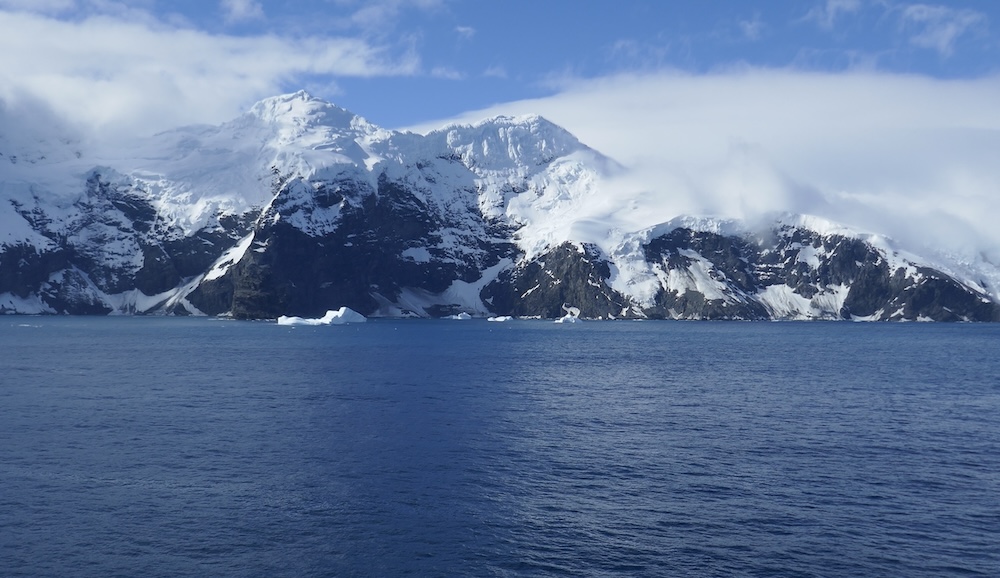
John, the beloved disciple of Yeshua, and who laid his head on his Master’s breast at the last supper and heard heaven’s heartbeat understood the bigger picture as well. His first epistle written when he was in his 90s is possibly his opus maximum of explaining his view of the higher Torah that encompasses both the letter and spirit of the Torah, the gospel message of the cross, and the message of love for Elohim and one’s fellow man. This is the true and ultimate expression of Christ-consciousness if you will. Here John lays out the spiritual upward path that is less traveled for sure. In a sense, this is like trekking the pristine, snow-covered fields of Antarctica where few humans have ever been. This is the path of Yeshua and those who have laid down their lives to trek after him.
- Walk in the light, not in the darkness (1 John 1:5–7).
- Walk as Yeshua walked (1 John 2:6).
- I bring you both and old and a new commandment (1 John 2:7–8).
- To love the world is not to love the Father (1 John 2:15).
- To become a glorified child of Elohim, walk as Yeshua did (1 John 3:1–3).
- If you are in a relationship with Yeshua, you will not be sinning by violating YHVH’s Torah-law (1 John 3:6).
- Loving one another passes one from death to life (1 John 3:13).
- Lay your life down for one another as Messiah laid his life down for each of us (1 John 3:16).
- He who does not love his neighbor does not know Elohim (1 John 4:7–9).
- One cannot love Elohim without loving one’s neighbor (1 John 4:21).
- Whoever has been spiritually born or regenerated by Elohim is not walking in habitual sin or Torahlessness (1 John 5:18).
Curiously, in all of these examples, there is little direct or specific mention of YHVH’s Torah-law or the law of Moses. Why? Because the apostles and saints spent less time talking about the Torah and more time demonstrating Torah-obedience through the actions of their lives. Their spiritual fruits spoke louder than merely waving Torah-scrolls at people, praying long prayers for show, wearing long fringes, parading around in a head-coverings, shouting “Glory Halleluyah” and speaking in tongues for all to hear, sanctimoniously saying Yeshua instead of Jesus, or pridefully and vociferously rejecting the Christmas tree and the bacon burger.
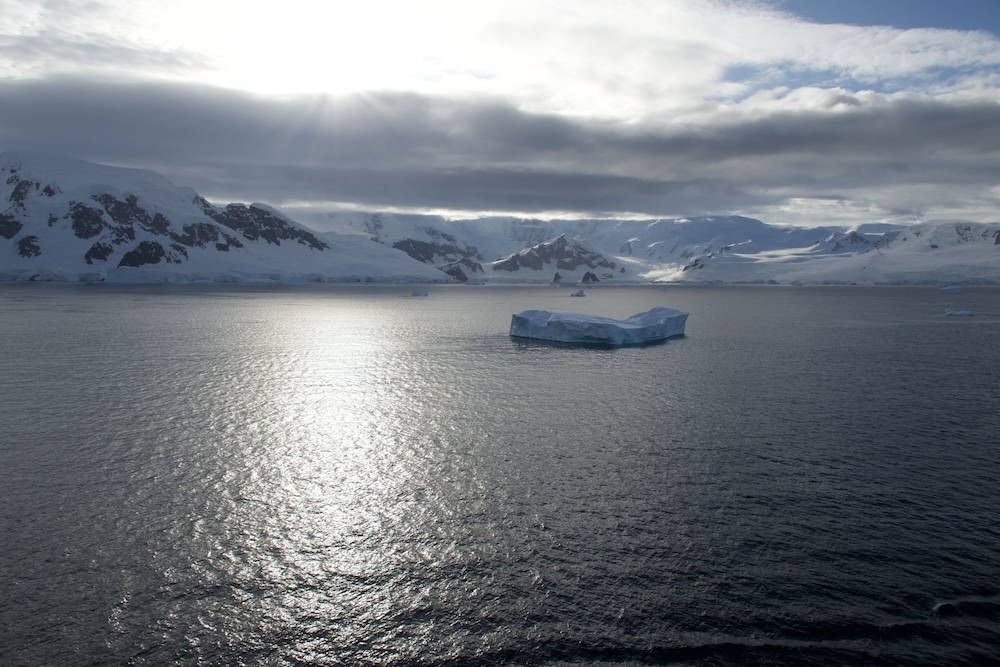
So to bring this discussion full circle, there is something about the Antarctic continent that is alluring and captivating. For me it is the almost deafening silence of it all coupled with its vast whiteness—pure and unspoiled as far as the eye can see. At first your eye zooms in on the thousands of pure white solitary icebergs tranquilly and silently floating by. Then you glance the looming glacial cliffs at the sea’s edge that calved the icebergs. From there, your gaze is transfixed on the rivers of crevasse-laced glacial ice, thousands of feet thick that stretch up into the mountains. Then your eye moves upwards to the lofty, white mountain peaks that birthed these countless miles of glaciers, whose summits and peaks pierce the white clouds of heaven or the celestial blue skies above depending on the day’s weather conditions. Into this, add a snow storm, and there is even more pure whiteness everywhere above and below. Whatever the case, from sea to heaven, it’s a chorus of blues and whites, which are the biblical colors of heaven and sinlessness and holy righteousness. Is it any wonder that the Antarctic in all of its pure and majestic pristineness, largely untouched by the hand of man, draws the heart and mind upward to the One who created it all? These region of the world is so out of the box and out of this world that your perceptions of many things are challenged including your view of normative Christianity and its view of the divine and the pathway there. At the same time one cannot help to ponder how we mortal, earthbound humans get from here to there. Selah.
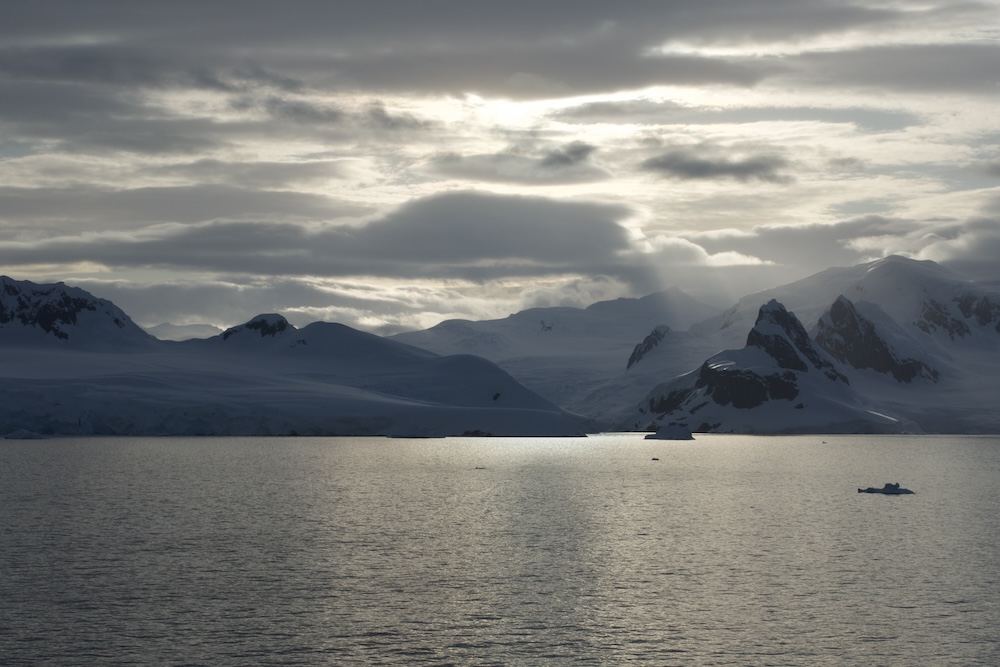
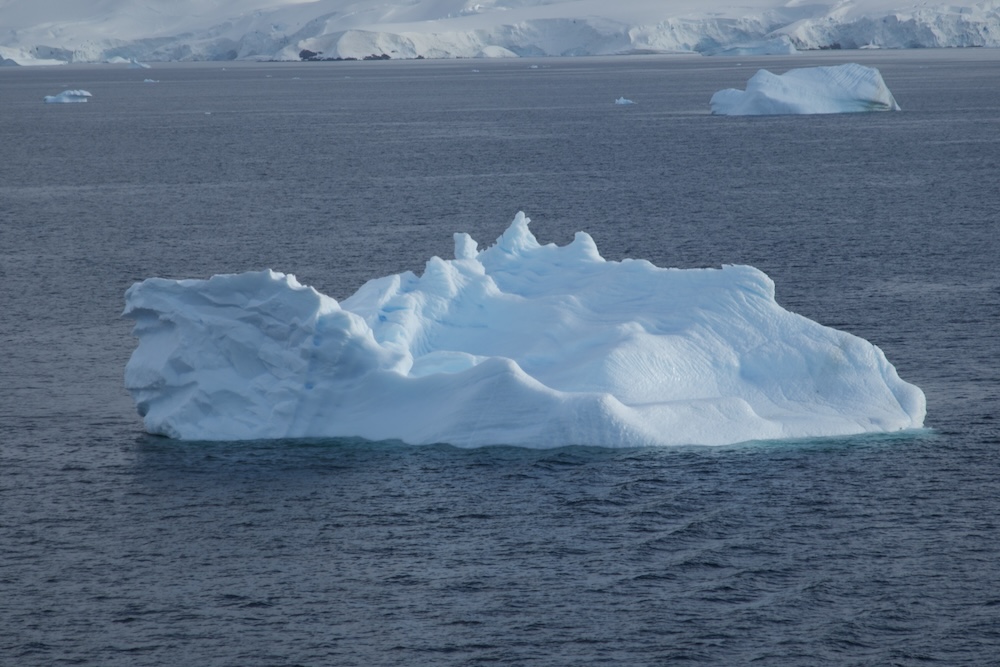
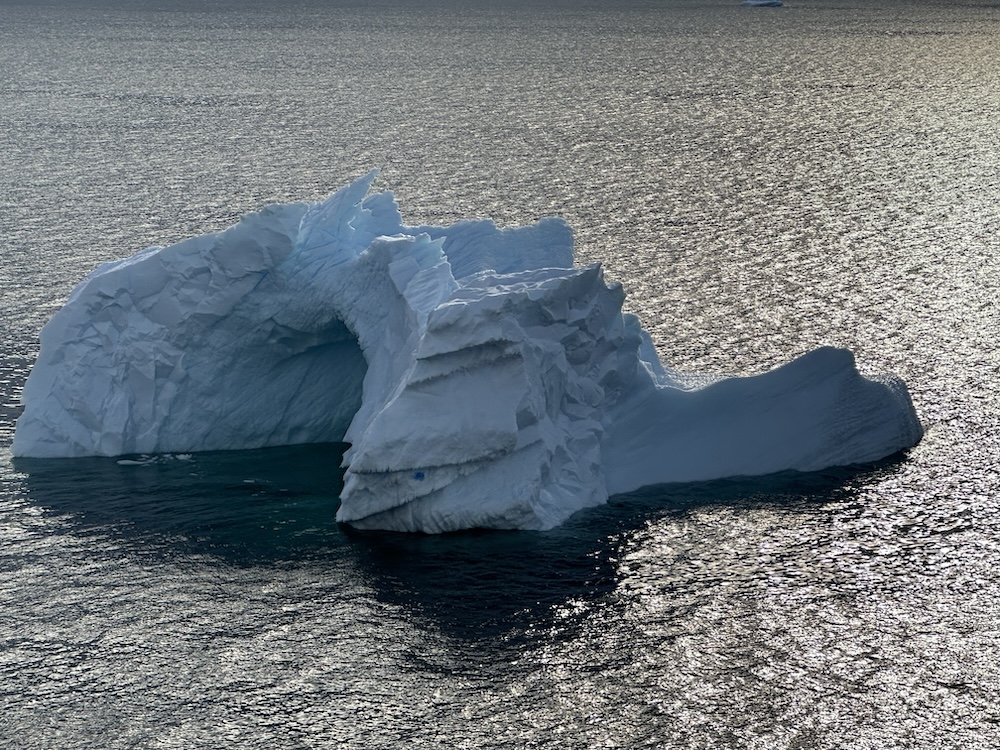
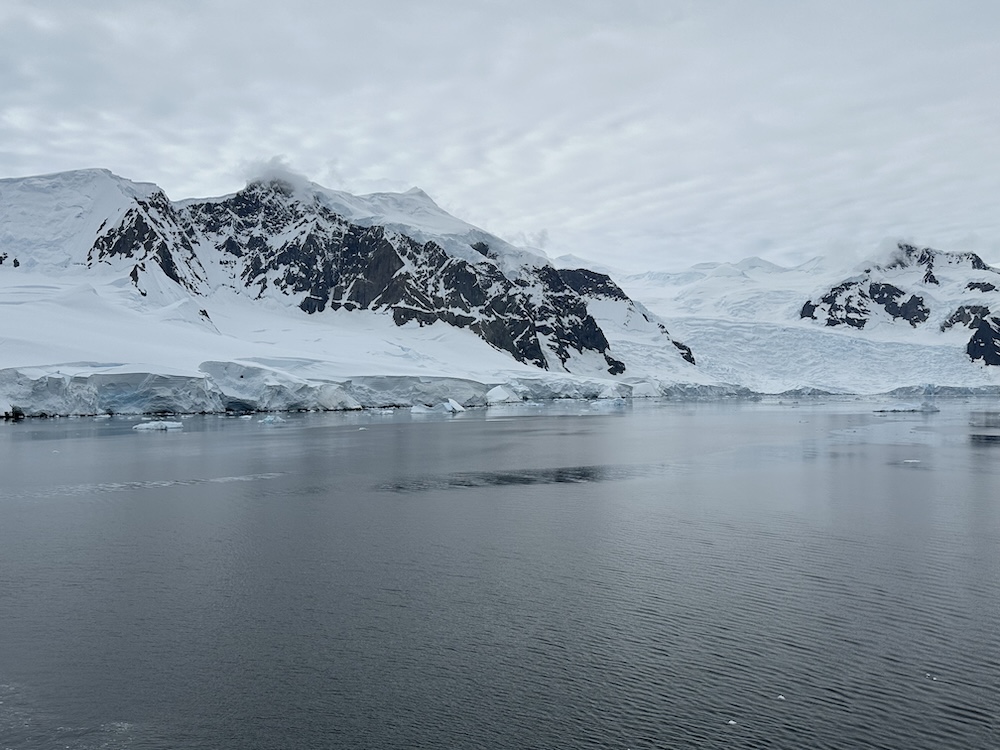
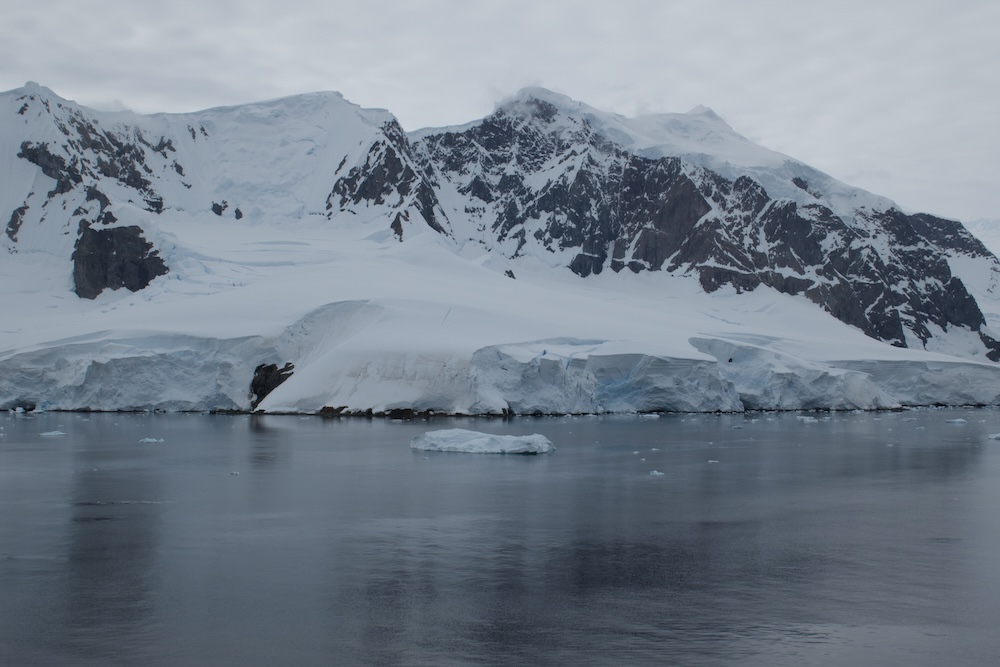


In your second photo of this post there’s an iceberg which is shaped like Moby Dick, a white Sperm Whale!
Welcome back from the fortress of solitude.
Blessings, John